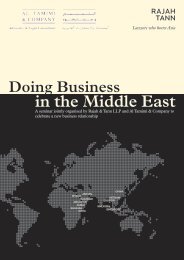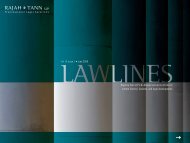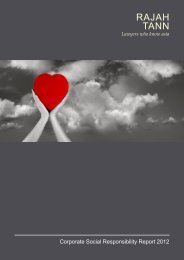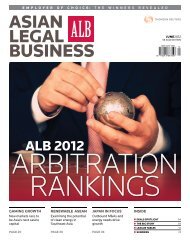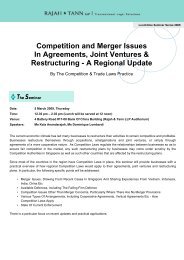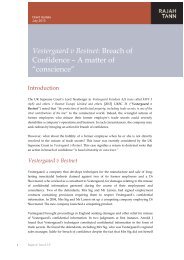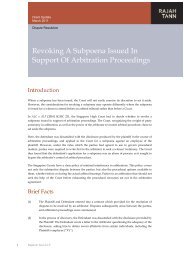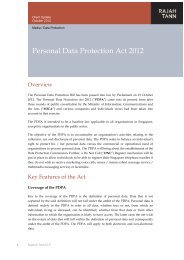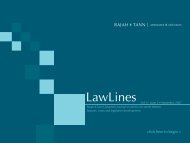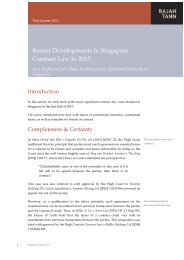Lawlines Volume 9 Issue 4 - eOASIS
Lawlines Volume 9 Issue 4 - eOASIS
Lawlines Volume 9 Issue 4 - eOASIS
Create successful ePaper yourself
Turn your PDF publications into a flip-book with our unique Google optimized e-Paper software.
LawLinesVol 9 . <strong>Issue</strong> 4 • December 2007Around Rajah & TannRound Up – 2007 InPerspectiveFeature ArticlesTo Withhold Or Not ToWithhold – That Is TheQuestionAll Abuzz About GamesCorporate SocialResponsibility UnderThe New IndonesianCompany LawCase BitesLegislation BitesFresh Evidence Admissible Even ThoughLadd v Mashall Conditions Not StrictlySatisfiedIn Su Sh-Hsyu v Wee Yue Chew (2007), theSingapore Court of Appeal held that the conditionsset out in Ladd v Marshall authorising the courtto receive fresh evidence on appeal must not berigidly applied. The three conditions are as follows:(i) the evidence could not have been obtainedwith reasonable diligence for use in the trial; (ii)the evidence must be such that, if given, wouldprobably have an important infl uence on the resultof the case, though it need not be decisive; and(iii) the evidence must be such as is presumably tobe believed or apparently credible.It said that that where fresh evidence uncoveredthe fraud of the other party, and such fraud struckat the very root of the litigation, the court wouldbe prepared to exercise measured fl exibility inapplying the fi rst Ladd condition. This fl exibility maybe exercised provided the second and third Laddconditions were cumulatively satisfi ed. In the caseat hand, the Court found that the subject fraudstruck at the very root of the litigation, and that thesecond and third conditions were satisfi ed. Theends of justice would be better served if the freshevidence would be admitted in evidence.Letter Of Request For Examination OfWitnesses In Foreign JurisdictionIn Credit Suisse v Lim Soon Fang Bryan (2007),the Assistant Registrar allowed the application ofa bank for a letter of request to be issued to theTaiwanese judicial authorities for the evidence oftwo witnesses to be taken in Taiwan. The matterwent on appeal to the Singapore High Court, wherethe Court stressed that it was satisfi ed that the bankwould not be able to procure the attendance of theproposed witnesses within Singapore. Moreover,the Court noted that the Bank ran a real risk thatit would not be able to call the relevant evidence ifthe order was not made. The Court then explainedthat it was premature for the appellant to object tothe admissibility of the deposition when the bankhad not decided yet whether to make use of thedeposition at the trial. It said that the proper timeto deal with the admissibility of the depositionwas after notice was given under order 38, rule9(2) of the Rules of Court to use the depositionat the trial.page 33 of 44 pages | print | comments | close



